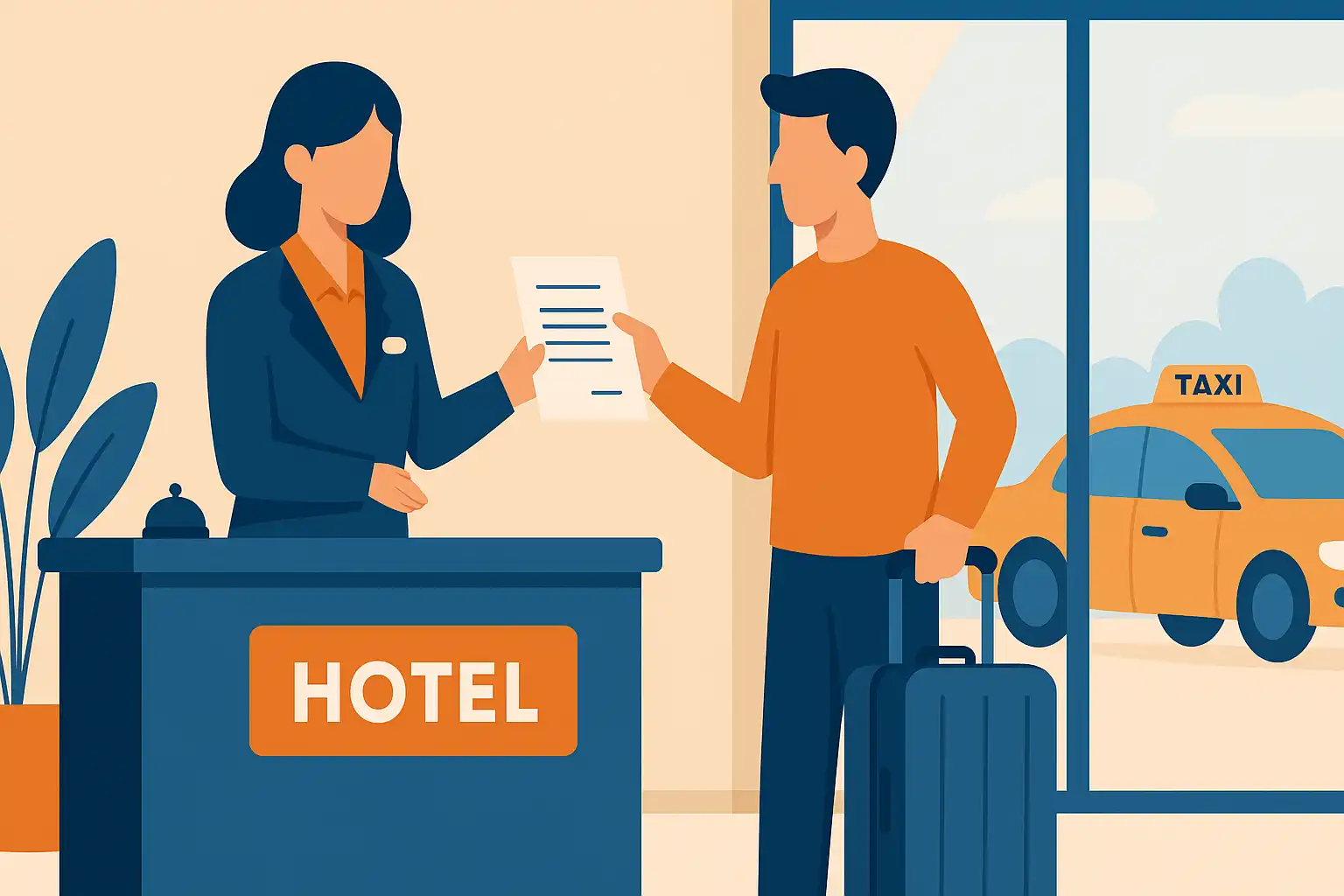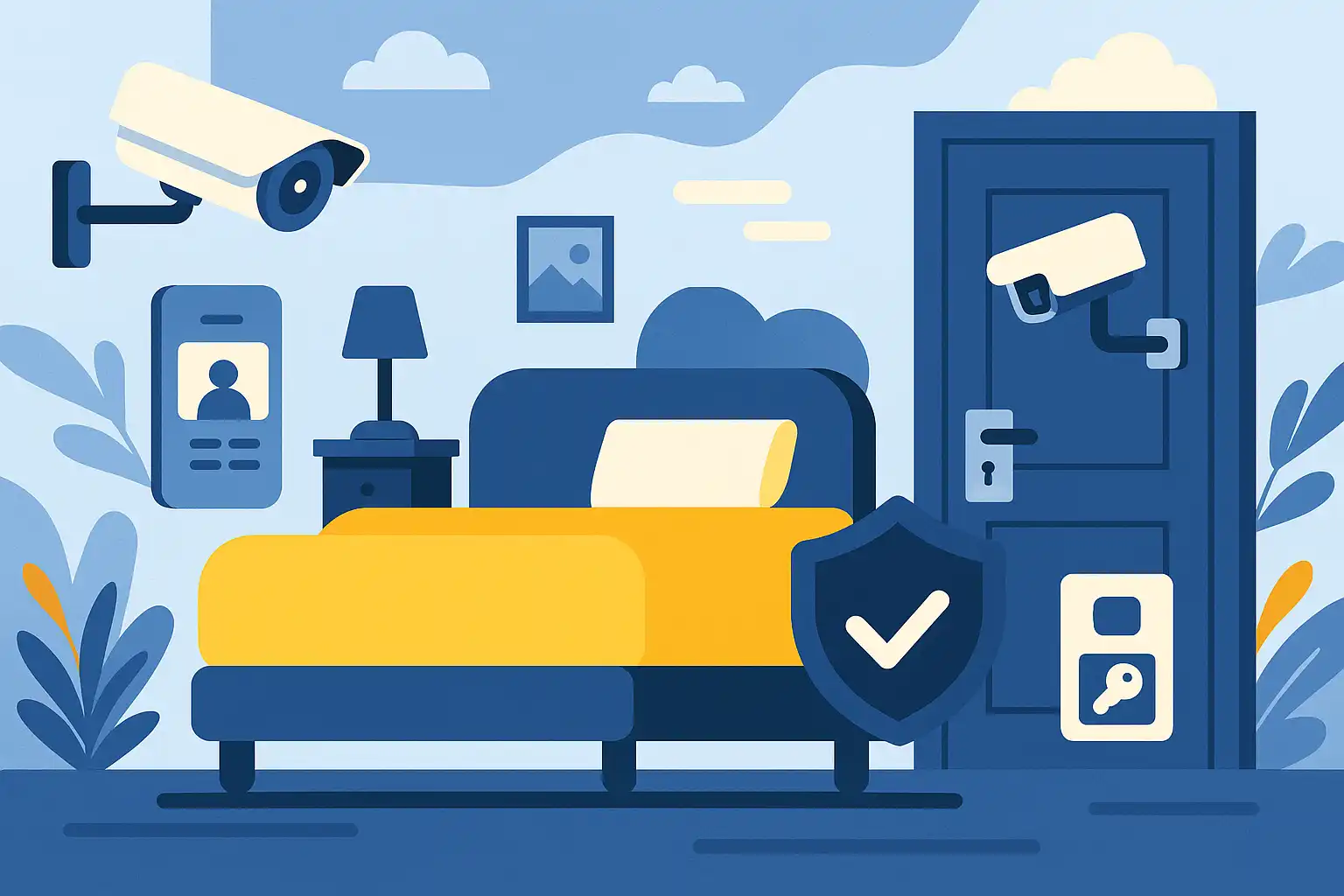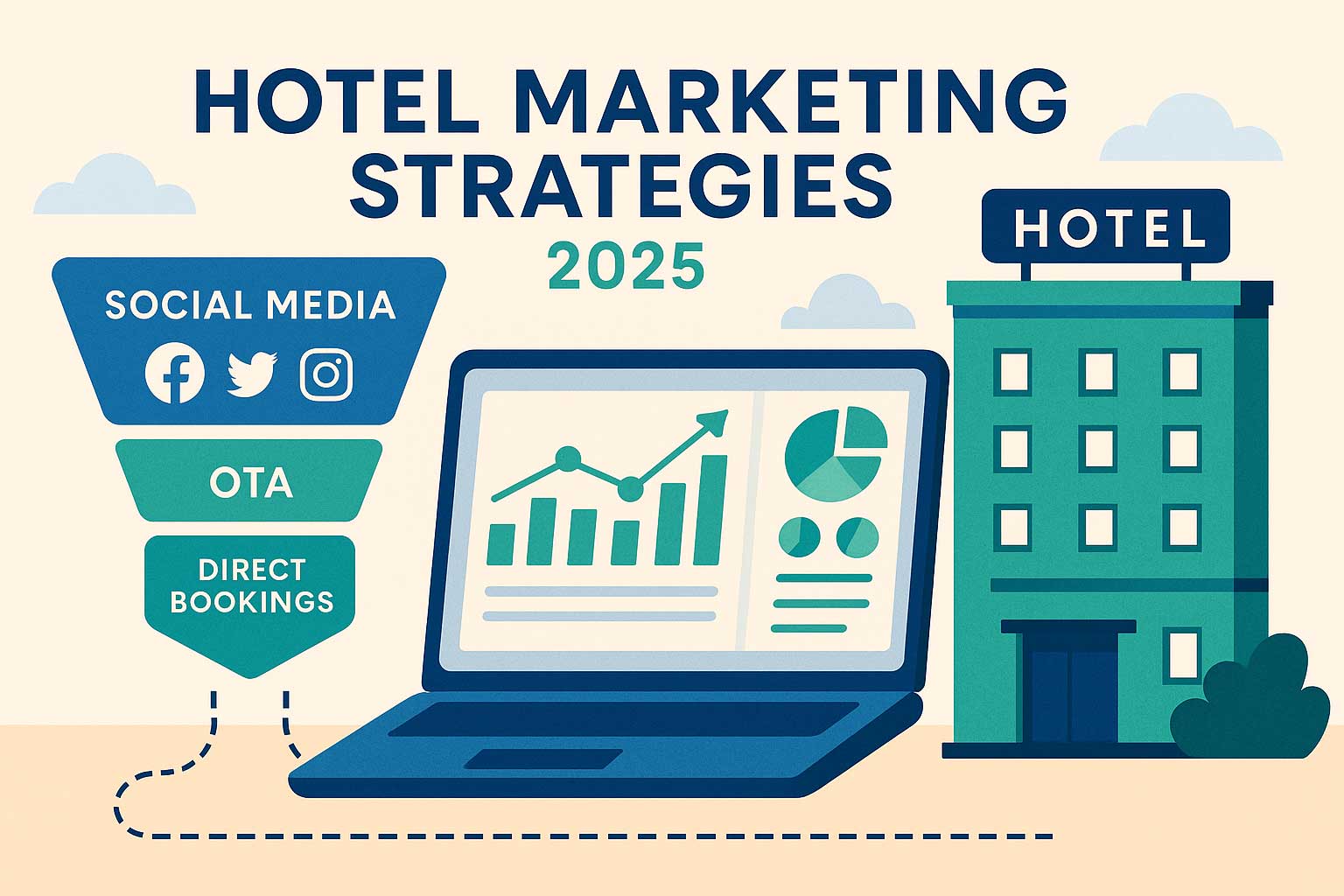Hotel Check In Time: Everything You Need to Know for a Smooth Arrival
Jul 26, 2025
 Mika Takahashi
Mika TakahashiPopular Categories
Hotel Technology & InnovationHotel Operations OptimizationDigital MarketingIndustry TrendsRevenue ManagementHospitality Industry
Popular Categories
Trending Post

Hotel Walk Letter Template: Professional Guest Communication

Online Travel Agents: What They Are and How They Work

Hotel Security Systems: Modern Protection Solutions

Hotel Advertising: Complete Guide to Boost Bookings and Revenue

25 Hotel Marketing Strategy Ideas for 2025: Complete Guide

AI Reservation Agent: Revolutionizing Hotel Booking and Guest Experience

PMS Communication: Streamlining Property Management Through Effective Guest Messaging
Table of contents
Travel excitement gets completely ruined when you check into a hotel only to find out that your room will not be ready until hours later. Knowledge of hotel check in time policies allows you to turn an unpleasant arrival experience into a smooth beginning of your journey.
The standard hotel check in times serve operational needs but experienced travelers understand methods to adapt to these schedules or find alternative solutions. Travelers who visit hotels regularly and those who vacation once a year should learn about hotel check in procedures because this knowledge will improve their travel experience.
This complete guide explains hotel check in schedules and advanced mobile check in systems while sharing expert advice for early room access and handling delayed departures.
What is the Standard Hotel Check-In Time?
The hospitality industry maintains a standard check-in period between 3:00 PM and 4:00 PM with 3:00 PM being the most widely used default across hotel chains globally. The selected check-in time represents a strategic choice to maximize both room availability and guest contentment.
Hotels establish their standard check-out period between 11:00 AM and noon which creates a vital 4-5 hour period for housekeeping activities. Hotel staff use this time period to perform complete room cleaning and maintenance checks before preparing accommodations for new guests.
Here’s how the typical hotel day breaks down:
| Time | Activity |
|---|---|
| 11:00 AM - 12:00 PM | Guest checkout |
| 12:00 PM - 3:00 PM | Housekeeping and room preparation |
| 3:00 PM - 4:00 PM | Standard check in time |
| 6:00 PM+ | Late arrivals |
The corporate nature of business hotels allows them to accommodate flexible check-in times because their clients have different schedules yet resort properties maintain strict standard check-in times during peak seasons. Hotels that operate internationally offer 24-hour reception services yet guests can only access their rooms based on standard check-in time policies and room availability.
Hotels enforce strict check-in schedules during peak travel seasons because they need to handle increased room turnover rates while maintaining operational efficiency. Hotels provide extended flexibility during off-peak times to boost guest satisfaction but this flexibility depends on available rooms and staff presence.
Why Hotels Have Specific Check-In Times
The hotel check in times follow a structured format which performs essential operational duties that affect both guest satisfaction and hotel operational efficiency.
Housekeeping Operations: The period between morning checkout and afternoon check-in allows housekeeping staff to perform complete room preparation. The housekeeping staff performs deep cleaning and surface sanitizing and linen washing and amenity restocking and maintenance repairs during this time. The operational success of large hotels with high occupancy depends on this specific time period to prevent operational delays.
Quality Control and Inspection: Supervisors perform thorough room inspections after cleaning to verify that all spaces meet hotel standards before guest arrival. The verification process involves checking for cleanliness as well as verifying that all amenities function properly and that special requests such as extra bedding or accessibility modifications have been implemented.
Guest Flow Management: The implementation of coordinated check-in times helps prevent front desk congestion while creating a more organized and predictable guest service experience. The systematic approach allows front desk staff to deliver individualized service instead of dealing with random arrival waves throughout the day.
Operational Synchronization: The hotel departments of security and luggage services and guest relations and maintenance operate their workflows in synchronization with check in and checkout times. The coordinated effort between departments enables proper staffing during busy times and maintains continuous hotel service operations throughout all service areas.
The process of room preparation becomes disrupted when previous guests stay late because this causes standard check-in rooms to become unavailable and hotels must provide either compensation or alternative accommodations.
How to Secure Early Check-In or Late Check-Out
Travelers who use smart methods need to plan ahead and communicate with hotels to obtain flexible check in options. The following strategies help travelers achieve better arrival and departure times at hotels.
Advance Communication Strategy: Contact the hotel 24-48 hours before your arrival to request early check in availability. Hotel staff need advance notice of 24-48 hours to pre-assign rooms or adjust their cleaning sequence according to your schedule. Hotels can provide estimated room readiness times based on their current occupancy levels.
Loyalty Program Benefits: Major hotel chains offer early check in and guaranteed late check out benefits to their top-tier loyalty program members. The benefits typically start at mid-level status and may include:
- Priority room assignment
- Early check in at no cost (when rooms become available)
- The ability to extend check out time until 4:00 PM.
- Mobile check in privileges
- Room upgrades that may become available earlier
Direct Booking Advantages: Hotels provide better accommodation for special requests when customers book directly instead of using third-party platforms. Hotel reservation systems enable early arrival flagging but third-party bookings often fail to transmit these preferences effectively to the property.
Timing Considerations: The flexibility of weekday arrivals exceeds that of weekend and holiday periods when hotel occupancy reaches its highest point. The time of year with reduced travel activity provides better opportunities to secure rooms early in your stay.
Fee-Based Guarantees: For guaranteed early access, consider these options:
- Previous night booking: Reserve the night before your intended arrival for immediate access regardless of time
- Early check in fees: Many hotels now charge $25-$100 for guaranteed early check in
- Suite upgrades: Higher room categories often become available earlier due to longer cleaning times
What Happens During Hotel Check-In Process
The hotel check in process requires knowledge to establish correct expectations which leads to faster arrival times. Hotel check in procedures today combine security protocols with operational requirements and guest-friendly features.
Identity and Reservation Verification: Show your valid government photo ID together with your booking confirmation which can be either digital or printed. The verification process serves three essential functions which include fraud prevention and regulatory compliance and accurate room assignment. The verification process for straightforward reservations usually takes 2-3 minutes.
Payment and Security Deposit: Hotels need credit card information for both incidentals and security deposits even when guests book prepaid stays. Deposit amounts vary based on:
- Hotel category and policies
- Length of stay
- Room type and amenities
- Expected guest spending patterns
Budget hotels may hold $50-$100, while luxury properties can authorize $200-$500 or more.
Room Assignment Process: Front desk staff assign rooms based on availability, reservation details, and guest preferences. This includes consideration of:
- Requested bed configurations
- Floor preferences or accessibility needs
- View requests (when possible)
- Special occasions or celebrations
Information Package and Amenities: Upon successful check in, guests receive:
- Physical or digital room keys
- WiFi access credentials
- Hotel amenity information (pool hours, breakfast times, gym access)
- Local area recommendations
- Emergency and safety information
Policy Overview: Hotel staff members at the front desk provide guests with essential hotel policies that include information about smoking rules and pet policies and quiet time regulations and COVID-19 safety measures. The briefing process helps to avoid guest confusion and leads to better satisfaction during their hotel stay.
Modern Check-In Technology Trends
The hospitality industry uses technological advancements to optimize hotel check in operations while improving guest satisfaction. The new developments provide travelers with unmatched convenience and authority to manage their arrival experience.
Mobile Check-In Revolution: Mobile check in allows guests to complete the entire check in process through smartphone apps before arriving at the property. This technology enables:
- Pre-arrival registration and room selection
- Digital identity verification
- Remote key activation
- Bypass of front desk entirely
Industry data shows that over 65% of new full-service and luxury hotels now offer mobile check in capabilities, with guest satisfaction scores for digital-first properties exceeding industry averages by 9 points.
Self-Service Kiosks: Lobby-based check in kiosks provide automated processing for guests who prefer self-service options. These systems handle:
- Reservation retrieval and verification
- Payment processing and deposit authorization
- Key card issuance
- Receipt generation
Self-service options particularly appeal to business travelers and tech-savvy guests who value efficiency over personal interaction.
Digital Key Technology: Modern digital keys eliminate the need for physical key cards through:
- Bluetooth connectivity for room access
- NFC (Near Field Communication) technology
- Mobile app integration
- Instant room changes and updates
Major providers like ASSA ABLOY and SALTO report that 50% of new hotel installations now include digital key capabilities.
Contactless Solutions: Health and safety concerns have accelerated adoption of contactless check in options:
- QR code scanning for instant registration
- Biometric verification (facial recognition, fingerprints)
- Voice-activated room controls
- Minimal physical contact throughout the process
Benefits of Mobile Check-In
Mobile check in technology delivers significant advantages for modern travelers seeking streamlined hotel experiences:
Time Efficiency: You can skip waiting at the front desk by going straight to your room after arrival. The benefit provides maximum value during busy check-in times and late-night arrivals because front desk staff may be short-handed.
Personalization and Control: Mobile platforms often allow guests to:
- Select specific rooms from available inventory
- View actual room photos and layouts
- Request specific amenities or services
- Communicate special needs or preferences
Immediate Access: Digital room keys become active when housekeeping verifies room readiness which can happen before the standard check-in period begins. The flexible check-in system provides the most benefit to guests who need to arrive early because of their flight schedules or tight travel plans.
Enhanced Communication: Hotel apps provide direct communication channels for:
- Service requests and concierge assistance
- Amenity reservations (spa, restaurant, activities)
- Housekeeping preferences and timing
- Feedback and issue resolution
Tips for Dealing with Check-In Time Restrictions
Travelers encounter check in time limitations even when they have made advance arrangements. The following practical strategies help travelers achieve maximum comfort and convenience during waiting periods:
Luggage Storage Solutions: Most hotels offer complimentary luggage storage at the front desk, allowing you to explore without carrying bags. This service typically includes:
- Secure storage areas with limited access
- Luggage tags with contact information
- Retrieval assistance when your room becomes available
- No time limits for storage duration
Amenity Access During Waiting: Many hotels allow early arrivals to access common facilities immediately:
- Fitness centers and pools
- Business lounges and WiFi areas
- On-site restaurants and bars
- Concierge services for local recommendations
Take advantage of these amenities to refresh and relax while waiting for room assignment.
Local Exploration Opportunities: Use the waiting time productively by:
- Exploring nearby attractions or shopping areas
- Enjoying local dining experiences
- Taking walking tours or sightseeing
- Visiting museums or cultural sites
Ask concierge staff for personalized recommendations based on your interests and available time.
Communication Strategy: Maintain positive relationships with hotel staff through:
- Polite acknowledgment of hotel policies
- Patience with operational constraints
- Clear communication about your schedule and needs
- Appreciation for staff efforts to accommodate requests
Remember that front desk staff work within established hotel’s policies and often have limited flexibility beyond standard procedures.
Strategic Arrival Planning: For future trips, consider these timing strategies:
- Airport hotel bookings for very early morning flights
- Late afternoon arrivals that align with standard check in time
- Extended first-night bookings for guaranteed early access
- Flexible travel schedules that accommodate hotel operations
Late Check-In Considerations
Understanding late arrival policies helps prevent room forfeiture and ensures smooth check in regardless of your arrival time.
Reservation Hold Policies: Most hotels maintain the following late arrival standards:
- Standard hold time: Rooms held until 6:00 AM the following day
- Guaranteed reservations: Extended hold times for advance payment or credit card guarantee
- Communication requirements: Notification expected for arrivals after midnight
- Release policies: Unclaimed rooms may be released earlier during peak periods
Late Arrival Fees: Some properties charge additional fees for late check ins:
- After-hours fees: $25-$75 for arrivals after 1:00-2:00 AM
- Staffing surcharges: Compensation for overnight desk coverage
- Security costs: Additional personnel for late-night arrivals
These fees vary significantly by hotel type, with luxury and chain properties less likely to impose late arrival charges.
Property Type Variations: Different hotel categories handle late arrivals differently:
Chain Hotels and Luxury Properties
- 24-hour front desk staffing
- Guaranteed room holds for confirmed reservations
- Mobile check in options for contactless late arrival
- Minimal or no late arrival fees
Boutique and Independent Hotels
- Limited overnight staffing
- Earlier room release times without advance notice
- Potential additional charges for after-hours service
- More personalized but less predictable policies
Best Practices for Late Arrivals: Ensure smooth late check in by:
- Providing accurate estimated arrival times when booking
- Calling the hotel if delays occur during travel
- Confirming reservation details and payment information
- Having booking confirmation readily accessible
- Understanding the property’s specific late arrival policies
Emergency Contact Information: Save hotel contact details and after-hours numbers in case of:
- Flight delays or travel disruptions
- Changes to arrival plans
- Need for special accommodations
- Room access issues upon arrival
Planning ahead for potential late arrivals prevents stress and ensures room availability regardless of travel complications.
Maximizing Your Hotel Check-In Experience
Travelers who understand hotel check in time policies can make better decisions about their arrival times to enhance their experience. The typical 3:00 PM to 4:00 PM check in period serves operational needs but hotels may accommodate early arrivals for guests who notify them in advance.
The check in process has undergone a transformation through modern technology which provides mobile check in and digital key systems for enhanced convenience. The essential elements for a better check in experience include advance communication and loyalty program participation and knowledge of hotel operations.
Key strategies for success include:
- Contacting hotels 24-48 hours before arrival for early check in requests
- Joining loyalty programs for priority treatment and flexible check in options
- Booking directly with hotels for better accommodation of special requests
- Utilizing mobile check in technology when available
- Planning arrival times that align with standard hotel operations
Hotel stays will start smoothly for all travelers when they understand these policies and strategies whether they have tight business schedules or want convenience during leisure travel. The hospitality industry adapts to guest requirements but travelers who understand established systems will always achieve their best experiences.
Hotel staff members strive to deliver outstanding service while working within their operational boundaries. The combination of positive attitude and clear communication with reasonable expectations builds exceptional hotel experiences which surpass the check-in process.
